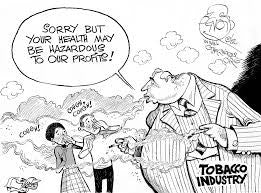Big Tobacco Is Bad For Free Enterprise

Big Tobacco is bad for free enterprise because they have a history of censoring scientific studies, utilizing political leverage, greatly influencing the media and violating fair business practices. The modern-day war that Big Tobacco has launched against the newly popular vaping industry is the best example that demonstrates the real power of these aspects and their ability to interfere with free enterprise.
Big Tobacco’s Past Censorship
Tobacco companies were caught red-handed covering up, altering and silencing scientific research on the dangers of cigarette smoke when over 40 million pages of secret documents were made public as part of a major settlement in 1998 (https://www.ncbi.nlm.nih.gov/pmc/articles/PMC1118313/). Prior to the settlement, international tobacco companies conspired together to suppress, buy-off and contain all independent scientific research related to cigarette smoke and cancer. Big companies used their money and power to coerce private researchers to remain silent or back away from any anti-tobacco findings.
The World Health Organization argues that tobacco companies responded to the fact that their product was unhealthy by creating doubt and controversy around the health risks rather than being truthful about the research. Scientists had confirmed the link between smoking and lung cancer as early as the 1950s, but tobacco companies continued to publicly deny the facts and claimed that research was inconclusive for decades. Philip Morris continued to deny that tobacco was harmful even after the conclusive US Surgeon General’s report of 1964 (http://www.who.int/tobacco/media/en/TobaccoExplained.pdf).
Censoring scientific research is extremely dangerous to free enterprise because it halts progress in other areas of scientific study and creates incentives to market addictive or unhealthy products. Keeping the cancer and cigarette link a secret, the tobacco company effectively silenced DNA-related research. Since their secret vault of documents has been made public, DNA research has exponentially increased and hundreds of diseases are being cured with these advancements.
Political Pull of Big Tobacco
Holding major political influence directly interferes with free enterprise. Federal and state employees can accept financial incentives and in turn influence federal and state legislation. If a senator directly benefits from supporting big tobacco initiatives, then it’s more than likely they will vote in favor of such bills. As part of a twisted settlement in 1998, the tobacco industry agreed to pay the state and federal medical bills associated with smoking. Around $200 billion in funds were allocated in the first 25 years of the settlement (https://www.propublica.org/article/how-wall-street-tobacco-deals-left-states-with-billions-in-toxic-debt). Even worse, tobacco bonds and deals have been struck among various private investors and states who have used borrowed money from Big Tobacco.
The political pull of Big Tobacco stems from such major financial contributions to politicians and congressional campaigns. Ash.org has created an interactive map that allows citizens to see for themselves how pervasive ‘tobacco’ money is in politics.
Media Influence
The National Cancer Institute stands firmly behind the notion that “tobacco industry forces are using the media to influence the attitudes and behavior of the American public,” (https://cancercontrol.cancer.gov/brp/tcrb/monographs/19/docs/M19MajorConclusionsFactSheet.pdf). Based on their research, traditional cigarettes are one of the top-marketed products in America, but education campaigns could effectively discourage tobacco use. As part of Big Tobacco’s 1998 settlement, they have control over reviewing all anti-tobacco ads and campaigns. Additionally, campaigns are barred from negatively targeting any specific tobacco brand or company in their messages.
Violating Business Standards
One of the greatest threats to free enterprise is businesses that refuse to follow business standards and laws. The tobacco industry has come under strict scrutiny in recent years for fueling illegal cigarette smuggling. The Action on Smoking and Health group accused Big Tobacco of flooding markets with illegal tobacco sources to gain public support for lowered cigarette taxes (http://www.independent.co.uk/news/uk/home-news/tobacco-industry-accused-of-fueling-cigarette-smuggling-to-boost-profits-10287003.html). The International Consortium of Investigative Journalists covered similar stories in 2000 and 2001 that exposed Big Tobacco of conspiring with criminal networks to illegally smuggle cigarettes across the globe (https://www.icij.org/project/big-tobacco-smuggling/about-project-big-tobacco-smuggling). These tactics boost sales, increase Big Tobacco’s market share and gives tobacco companies further political leverage.
War on Vaping
Big Tobacco’s war on the newly emerging vaping market is a real-world example of the true power of the industry’s manipulation of facts, political pull, media manipulation, and unfair business practices. Tobacco companies have widely published and pushed the potential health hazards associated with vaping, while still actively downplaying the harmful additives in traditional cigarettes. By effectively launching a media fear campaign on the dangers of vaping, Big Tobacco was able to convince Congress to back laws favoring e-cig regulations.
Last year, the FDA rolled out sweeping e-cigarette regulations that makes electronic nicotine delivery systems go through a product application process. The FDA’s application process is estimated to cost between $3 million and $20 million (http://www.thefiscaltimes.com/Columns/2016/05/06/FDA-Just-Gave-Big-Tobacco-Big-Win-Vaping). At such costs, big tobacco has a giant advantage over small, local vaping companies. Unsurprisingly, two of the biggest companies pushing for FDA regulations on e-cigs were Lorillard Inc, maker of Newport cigarettes, and Reynolds American Inc, the producers of Camel cigarettes.
Big Tobacco is dangerous for free enterprise. Their power lies in their control over research, political pull, media manipulation, and their unfair business practices. The unfortunate reality is that the same companies that profit billions of dollars selling addictive cancer-causing cigarettes are simultaneously influencing Congress to tax, de-fund and regulate products that have been proven to help people break their cigarette addictions.
Author: David Nadel
Read more:
In-Depth History of Big Tobacco
Northland Vapor VS Big Tobacco





